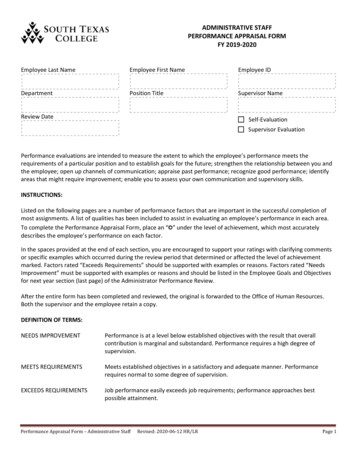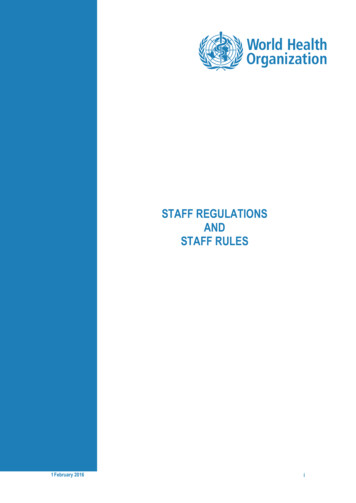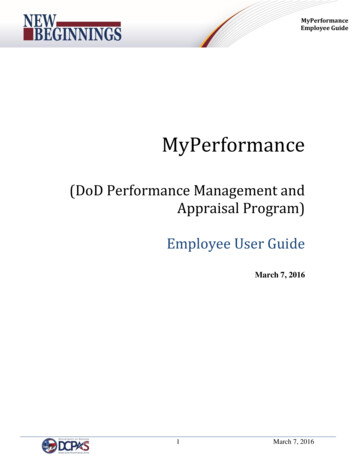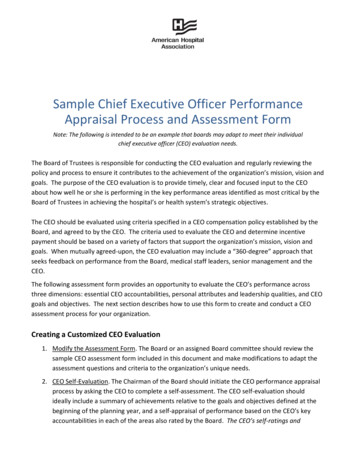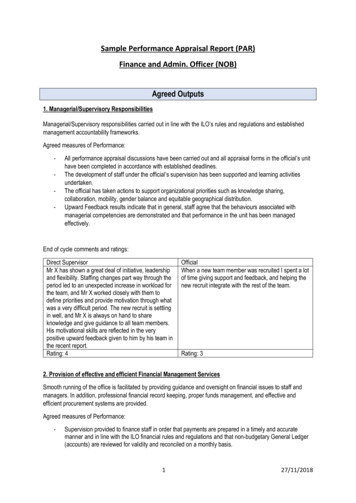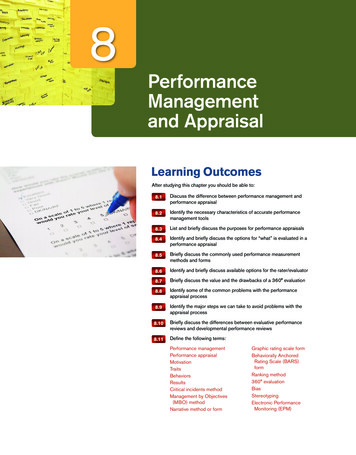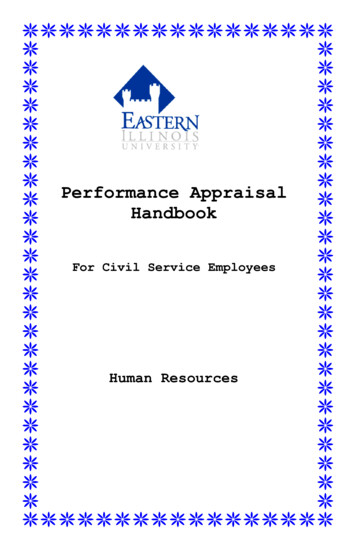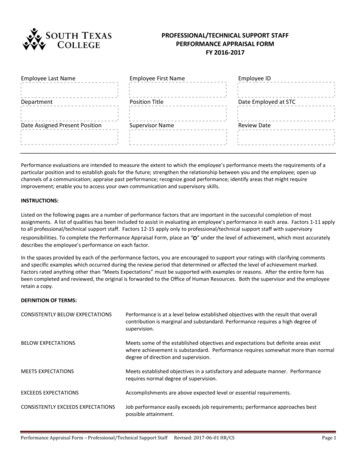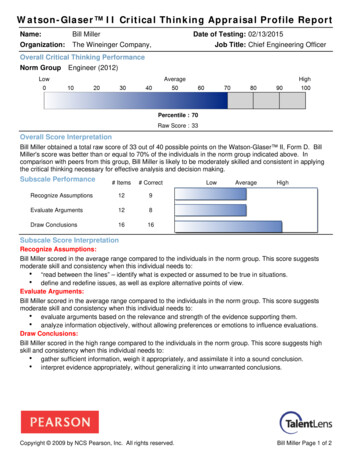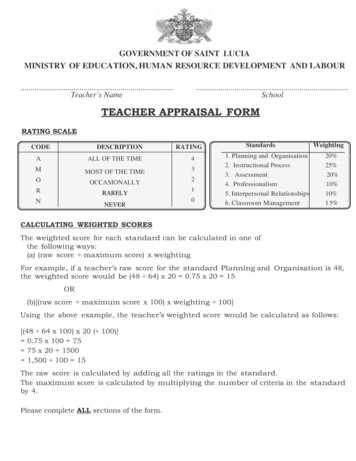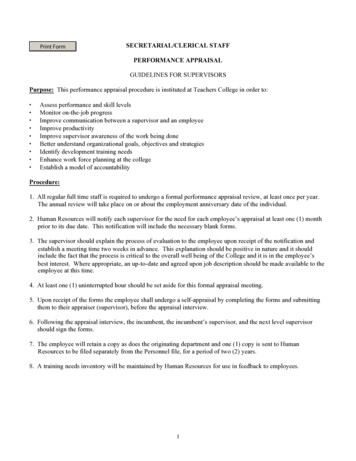
Transcription
Print FormSECRETARIAL/CLERICAL STAFFPERFORMANCE APPRAISALGUIDELINES FOR SUPERVISORSPurpose: This performance appraisal procedure is instituted at Teachers College in order to: Assess performance and skill levelsMonitor on-the-job progressImprove communication between a supervisor and an employeeImprove productivityImprove supervisor awareness of the work being doneBetter understand organizational goals, objectives and strategiesIdentify development training needsEnhance work force planning at the collegeEstablish a model of accountabilityProcedure:1. All regular full time staff is required to undergo a formal performance appraisal review, at least once per year.The annual review will take place on or about the employment anniversary date of the individual.2. Human Resources will notify each supervisor for the need for each employee’s appraisal at least one (1) monthprior to its due date. This notification will include the necessary blank forms.3. The supervisor should explain the process of evaluation to the employee upon receipt of the notification andestablish a meeting time two weeks in advance. This explanation should be positive in nature and it shouldinclude the fact that the process is critical to the overall well being of the College and it is in the employee’sbest interest. Where appropriate, an up-to-date and agreed upon job description should be made available to theemployee at this time.4. At least one (1) uninterrupted hour should be set aside for this formal appraisal meeting.5. Upon receipt of the forms the employee shall undergo a self-appraisal by completing the forms and submittingthem to their appraiser (supervisor), before the appraisal interview.6. Following the appraisal interview, the incumbent, the incumbent’s supervisor, and the next level supervisorshould sign the forms.7. The employee will retain a copy as does the originating department and one (1) copy is sent to HumanResources to be filed separately from the Personnel file, for a period of two (2) years.8. A training needs inventory will be maintained by Human Resources for use in feedback to employees.1
SECRETARIAL/CLERICAL STAFFPERFORMANCE APPRAISAL GUIDELINESFor the Appraiser:1. Do not administer a performance appraisal at the time when formal disciplinary proceedings are under waywith an individual employee.2. Do not evaluate attitude per se, but instead evaluate attitude as it is manifested by one’s behavior.3. There should be no surprises during the performance appraisal process. Any concerns should have beenhighlighted with an employee as they arise during the year.4. Plan carefully; do not rely on your memory; keep records and notes throughout the year.5. Do not blame weak performance on an employee’s character.6. Do not have the entire appraisal form filled out before the meeting. Leave room for comments resulting fromthe discussion.7. Ensure that each performance criteria judgment is substantiated by at least one example.8. Judge the work, not the person.9. Look not only at the outcome, but also at the method.10. Set a specific agenda; keep the discussion on track.11. Ask for and allow the employee to give feedback, which might involve comments on your supervision.12. Be aware of alternative training paths i.e., job redesign, rotation, etc.13. Do not compare an employee to a co-worker, as this could raise the question of favoritism.2
SECRETARIAL/CLERICAL EMPLOYEESPERFORMANCE APPRAISALEmployee NameJob GradeDept./DivisionPosition TitleStart DateDate Appraisal CompletedDate of Previous AppraisalOBJECTIVEAlthough daily assessment is a vital function of every supervisor, a formal Performance Appraisal provides for acomprehensive discussion of overall employee performance.Purposes of the review are many, but generally the exercise should address the following areas:a. To assess performance/skill levelsb. To improve communication flowc. To define training needsPREPARATIONCertain prerequisites should be set in order to effect a meaningful review:Before the interview, you should review the employee’s job description, the previous performance appraisal, aswell as any specific tasks, projects, or objectives that were assigned during the past year. A minimum of five (5)days should be provided for the employee to prepare for the uninterrupted discussion that will follow.INTERVIEW GUIDELINES1.2.3.4.5.Ensure that the employee has completed his/her appraisal before the interview (optional).Accentuate the positive, but be candid.Support statements about performance/behavior with examples.Set realistic goals.Beware of:Personal biasesCriticism of personality traits/attitudesComparison to another specific employeeFalse standards6. Ensure adherence to proposed work plans, goals, and job descriptions.FILINGPerformance Appraisals are maintained for a maximum of two years in Human Resources, filed separately from thepersonnel files. The direct supervisor and employee should retain a signed copy of the completed appraisal.3
GUIDE TO COMPLETIONPART A: Contains a number of factors, which will assist in appraising overall performance objectively andestablishing levels of proven performance.PART B: Assists in analyzing steps to be taken by both the supervisor and incumbent to sustain or improveperformance in the future.PART C: Assists in career mobility and training consideration.PART AThe following are not necessarily in order of importance/significance (more than one area can be checked ifapplicable):1. QUALITY OF WORK: Is it usable as presented?EmployeeSupervisorAlways above averageCan be accepted without checkingUsually acceptableFrequently requires work to be redone2. QUANTITY OF WORK: Productivity:Normally performs special assignments in addition to regular workRegular duties completed in time to allow for some special assignmentsMeets expectations as outlined in the job descriptionRequires improvement3. ABILITY TO MEET DEADLINES: Normal workload:Can cope even with peak loadsUsually ready in advanceNormally on timeFrequently late4. ACCEPTING RESPONSIBILITY: In addition to those assigned with position:Normally does more than the minimum job requirementsOften able to undertake and complete new types of assignmentsAble to handle additional tasks from time to timePerforms regular duties adequatelyPerforms responsibilities inadequately5. PREVENTING OR COPING WITH PROBLEMS: Independent action in dealing with variety andcomplexity of duties:Sound judgment–able to analyze problems ad cope with situations on own ingenuityAlert–uses routine discretion in minor mattersAnticipates problems, but requires discretion from supervisor for actionLacks foresight–usually caught unaware4
6. ORGANIZATIONAL SKILLS: Getting plans into effect:EmployeeSupervisorCapable of taking responsibility for organizing projectsExecutes plans well on ownSome skill, but requires coaching from supervisorDoes not put plans into effect7. INNOVATION AND CREATIVITY: To perform in addition to routine job assignments:Often suggests approaches and implements methodsImproves methods of work routine and completes tasks requiring imaginationSometimes shows imagination in work methodsHandles only routine tasks in an established manner8. INITIATIVE: Self-starter, goes ahead (implements) on own:Prefers to act on own and does so effectively/ineffectivelyConstructively independentTakes action when need is evidentHesitates to take actionNo evidence –must be told9. RELIABILITY: Ability to work without supervision:Can be relied upon to carry out responsibilities even under difficult circumstancesKeeps head even in a crisisWorks well on ownRequires occasional checkingMust be constantly supervised10. WORK HABITS: Punctuality, Attendance:Always dependable–willing to go the extra mileGenerally displays dependabilityOccasionally demonstrates poor work habitsFrequently demonstrates poor work habits11. JOB KNOWLEDGE: Familiar with rules, regulations, guidelines/policies, legislation:Thoroughly familiar and knows some of next higher jobVery familiar–seeks help with non-routine mattersAdequate knowledgeInsufficient knowledgeSUPERVISOR SUMMARY COMMENTSPlease use the space below to comment in your words on the performance of the employee, specifically in respectto results and progress since last review.5
OVERALL PERFORMANCE RATINGSupervisor to check one: Exceeds expected output.Meets job expectations.Areas for improvement are identified.Unsatisfactory–falls short of minimum performance expectations.PART BComment on each of the following characteristics as they relate to on-the-job performance (please includeexamples). Also identify the significance of each of these characteristics.EmployeeSupervisorLevel of significance (H High, M Medium, L Low)1. INTERPERSONAL SKILLS: Ability to relate to others, particularly in obtainingand giving cooperation; effective team member.2. COMMUNICATION: Ability to express ideas clearly and ensure understanding;ability to listen and learn from others; ability to recognize and use informalchannels of communication.3. SELF-IMPROVEMENT: Effort to acquire and utilize new or additional skills, toseek additional responsibilities.4. PERSEVERANCE: Ability to complete a task despite difficulties and adjustedpriorities.6
EmployeeSupervisorLevel of significance (H High, M Medium, L Low)5. EFFICIENCY: Effective time management skills.6. COMMITMENT: Positive, enthusiastic/optimistic approach. Takes pride inworking toward organizational objectives.ADDITIONAL CRITERIA AND COMMENTS:You may wish the space below to identify any additional points that you consider appropriate. (e.g., What arehis/her greater strengths? What areas require improvement?).PART CThe space below is provided for a record of the results of the appraisal discussion i. e., what plans were made, andwhat specific action is to be taken by both parties.1. DEVELOPMENT PLAN FOR IMPROVEMENTObjectives(Actions to be taken by employee)Supervisor’s Commitment to Action(e.g., training)7BudgetApprovedTarget Date forCompletion
2. JOB INTERESTSEmployee’s interestsSupervisor’s comments2. COMMENTS REGARDING THIS APPRAISAL MEETING (e.g., thoroughness, adequate time andlocation, and eImmediate SupervisorDateNext Level SupervisorDate8
All regular full time staff is required to undergo a formal performance appraisal review, at least once per year. The annual review will take place on or about the employment anniversary date of the individual. 2. Human Resources will notify each supervisor for the ne
